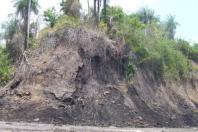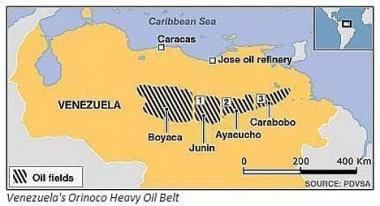Venezuela
The plot:
Recently recognized by the international energy agency to have the largest oil deposits on the planet, the vast Orinoco bitumen deposits have seen only a portion of the development as Canada's tar sands have. Nonetheless, the in-situ operations in Venezuela currently are massive and very carbon intensive projects, sought to be carried out with minority partners of energy corporations often from outside the Western sphere (involving, for instance, Russian and Chinese interests).
The details:
Approximately 300 bn bbl of bitumen estimated to be recoverable (largest recoverable deposit on earth).
Too deep for surface mining in 88-92% of the territory. In situ (SagD & CSS) required. Mining not ruled out.
After nationalization of the Orinoco Belt in 2007, all projects are 50 + percent controlled by national oil company, Petróleos de Venezuela (PDVSA).
Several large in-situ operations exist. TOTAL of France currently involved with PDVSA on PetroCedeño (along with less than 10% Statoil of Norway).
Other international players have remained in Venezuela as minority shareholders, such as ENI (in the Junin region) and BP (through a joint venture spin off with Russian corporation TNK-BP, 50% owned by BP in PetroMonagas).
Current & projected future partners:
Petrovietnam
Chevron [US]
Repsol [of Spain]
CNPC [of China]
ENI [Italy]
Petronas [Malaysia]
ONGC [India]
TOTAL [France]
BP [UK]
Statoil [Norway]
also other unnamed Russian and Japanese interests.
(source: PDVSA)
PDVSA states goals of 2.1 mbpd by 2019; current figure is approximately .6 mbpd.
PDVSA has led many attempts to integrate themselves as leaders in oil distribution in the region (through such projects as PetroCaribé), but has not sought to lead development or extraction in other territories.



